REU Undergrads Experience Research, What Graduate School Is Like
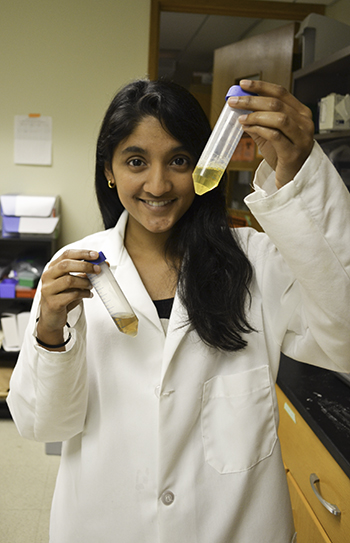
nano@illinois REU participant Rumya Raghavan.
August 25, 2015
Twenty-six undergrads helped with cutting-edge research at Illinois this past summer as part of three NSF-funded Research Experience for Undergraduates (REU) programs: the nano@illinois, EBICS, and Bioimaging REUs. In addition to the research experience itself, as a side benefit, participants got to find out what being a graduate student is like and possibly decide if research—particularly the area they were studying this summer—might be the career for them.
In addition to the research, which included being mentored by both research professors and graduate students and receiving in-depth training about their subject matter, during the 10-week program from May 26–July 31, 2015, students received practical training and even developed a poster about their research which they presented at the Illinois Summer Research Symposium at the I-Hotel at the end of the summer.
The three REUs collaborated to provide quality programming for the students, including joint seminars. All three also partnered with the Summer Research Opportunities Program (SROP), which provided evening seminars during which students were taught how to write research papers, give a presentation, create a poster, and develop a CV or a resume, which the rising juniors and seniors found especially helpful.
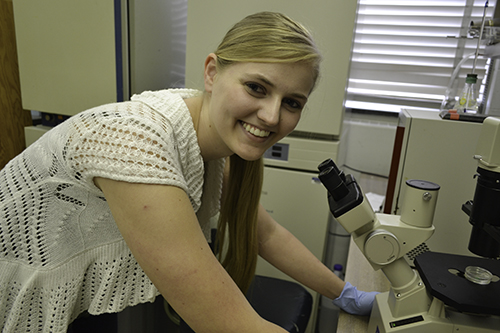
Bioengineering REU participant Maura Slattery, a rising junior studying Biochemistry at St. Xavier.
For example, Bioengineering REU participant Maura Slattery particularly appreciated the practical, career-related training.
“We’ve looked into applying for fellowships with NSF, and how to write a CV, and how to write a cover letter," says Slattery..."You look online, it kind of helps you. But actually sitting through a seminar having people who’ve done it before tell you the mistakes they’ve made, the proper way to do things—for me it’s probably one of the biggest things I’ll get out of this…knowing how to be a good candidate for graduate school.”
According to Carrie Kouadio, Program Coordinator for both the nano@illinois and EBICS REUs, collaborations with other REUs and SROP helped form a community of like-minded peers and fostered relationship-building:
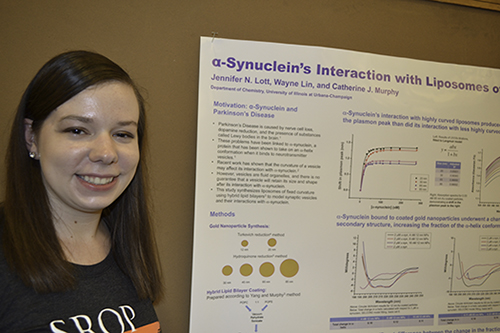
Jennifer Lott, who was part of the nano@illinois REU, presents her research poster at the Illinois Summer Research Symposium.
“What’s cool is they all get to interact with each other,” she explains. “So they have these joint sessions that they all get to see each other at. They also have their evening sessions where they see each other. They have social events on the weekends, and they all live together in Hendrick House, so they’re eating breakfast, lunch, dinner together. So it’s a nice community that they’ve got going on.”
The REUs all had the goal of recruiting a diverse group of participants—which they all met. For example, of the nano@illinois REU’s 11 participants, 90% were under-represented students; 100% of EBICS’s five participants were from underrepresented populations; 80% of the Bioimaging REU’s ten students were from under-represented groups.
Another goal of the REUS, which they met: the students all had really great research experiences.
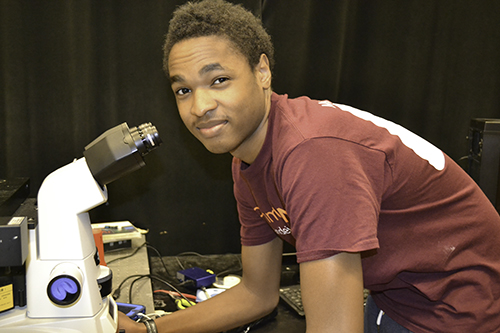
EBICS REU participant Solomon McBride, who did his research in ECE professor Gabriel Popescu's lab.
According to Kouadio, the students all appreciated the opportunity:
“It’s tremendously good to have on their CVs to have this experience. I think they’re all really grateful that they have the chance to be here and work with their faculty. They really respect their faculty and their research mentors a lot. They’re very productive, working very hard, so we really do have an excellent group of students.”
The students also appreciated the networking opportunities: “They’re getting a chance to network with each other. They get to interact with people from all over the US. Puerto Rico, MIT, a smaller university. There’s great diversity, so they really just have an excellent opportunity to get to know people and be in world class labs, super cutting-edge research, excellent faculty...It’s been a wonderful opportunity for them.”
According to Kouadio, one of the biggest hoped-for impacts was that the students would: “consider graduate school in these areas that they’re studying. For some of them, it really reiterates that, ‘Yes, I want to go to graduate school,’ and, ‘Yes, I want to go in this area.’”
This was the case for Bioengineering REU participant Maura Slattery, who believes the experience helped prepare her for grad school: “I feel that now I have a sense of what grad school would be like and what’s expected. That is probably the biggest thing I’ve gotten from this program...just really getting to see what is expected in grad school.”
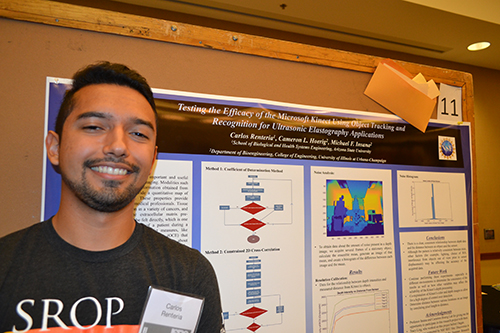
Bioengineering REU participant Carlos Renteria presents his research at the Illinois Summer Research Symposium.
This was also the case for Bioimaging REU participant Carlos Renteria, a rising senior in Biomedical Engineering at Arizona State University. Rentaria wants to get a Ph.D. in bioengineering and eventually go into research and says this experience helped him decide:
“It really helped me grow aware of what my strengths were and what my strengths weren’t,” admits Renteria. “Right off the bat, I knew I wanted to go into biomedical imaging. I didn’t have too much of a strong background in image processing, so it helped me get a feel for that...It helped build my strengths for the specific thing I am interested in going into.”
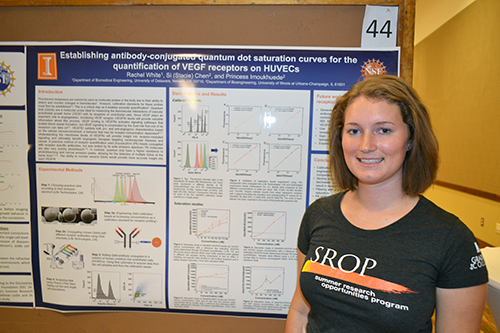
Bioengineering REU participant Rachel White presents her research on quantum dots at the Illinois Summer Research Symposium.
Another Bioimaging REU participant Rachel White, a senior at the University of Delaware majoring in Biomedical Engineering, says she definitely wants to go into research and indicates the summer helped her make some career decisions. "It helped me hone my focus and figure out what I really want to go into. I knew that I liked working with cells or working in a field where you’re learning about the body, but I wasn’t really sure outside of that what I wanted to do. This program is bioimaging focused, and that has really helped me learn that. I really like the fact that you can use these different imaging techniques to understand about the body, so that’s helped me figure out that that’s the path I want to go down.”
EBICS REU participant Catherine Sullivan, a rising senior double majoring in Materials Science Engineering and Biomedical Engineering at Carnegie Mellon University, especially appreciated learning what grad school is like: “I think research is a great opportunity for undergraduate students who are interested in pursuing a PhD to get hands-on experience in the lab and understand more of the dynamics of what happens in graduate school.”
However, for those who don’t necessarily want to go into the specific area they researched, Kouadio wants the students to have a useful experience, “so that they can evaluate whether they should go to graduate school.”
For example, another EBICS REU student, Stephanie Schramm, a rising senior in Biological Engineering at Purdue University, indicated that while she's not sure the exact field she wants to go into, her REU experience helped her discover that she definitely wants a career in research: “I’m really glad I did this summer because I’m hoping to pursue research now. I always thought I wanted to, but this just confirmed that I’m definitely interested in it.”
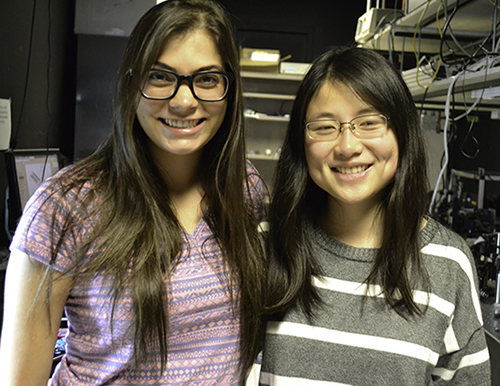
Bioimaging REU participant Casey Troccoli and her graduate student mentor.
This was also true for Bioimaging REU student Casey Troccoli, a rising senior double majoring in Engineering Physics and Optical Engineering at Rose-Hulman Institute of Technology in Terre Haute, Indiana. Troccoli indicates that this was her first experience working with a graduate student doing grad school–level work, and it helped her see the importance of continuing her education.
“It’s definitely opened my eyes to the possibility [of research]. Right now I’d still prefer to go into industry, but before I wasn’t planning on getting any degree after college. Iit did make me realize that getting a type of degree—in my terms the MBA—it’s a good opportunity. Any Masters would be better than nothing.”
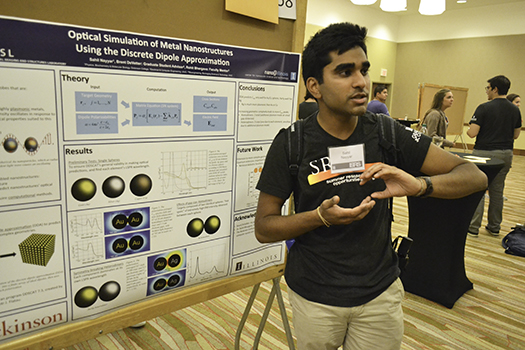
Sahil Nayyar, a participant in the nano@illinois REU, explains his research on the optical stimulation of metal nanostructures to a visitor to the Illinois Summer Research Symposium.
Kouadio even admits that they’re ok with students deciding they don’t want a career in the area they researched:
“Maybe they do research in one area and they realize, ‘I don’t really want to do that, but I can see that I want to do this.’ So it doesn’t change their decision to go to graduate school, it’s just a refocus of which field."
She says they’re even ok with students discovering they don’t like research: “For some of them, they realize they don’t really like doing research…and that is totally ok, but this helps them have that experience so they can make a decision about what it is they want to do.”
Author/Photographer: Elizabeth Innes, Communications Specialist, I-STEM Education Initiative
More: Biology, EBICS, nano@illinois , REU, REU: Bioimaging, REU: EBICS, REU: nano@illinois, Summer Research, Undergrad, 2015
For additional istem articles about summer 2015 REUs, see:
- 2015 EBICS REU Undergrads Are Exposed to the World of Research, Graduate School
- Summer Research Experience Exposes Undergrads to Bioimaging at Illinois
- nano@illinois REU Undergrads Experience Growth Via Nanotechnology Research
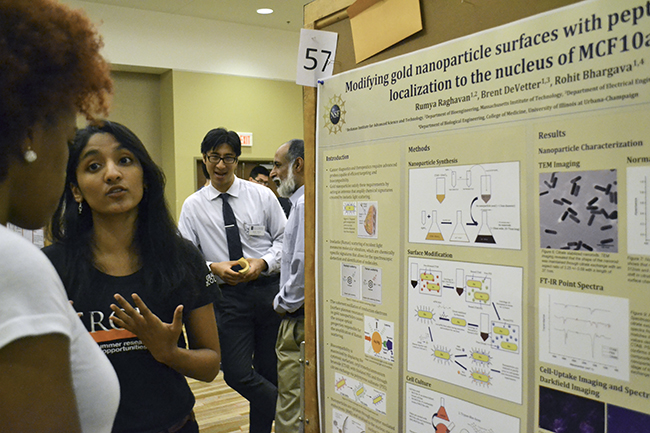
nano@illinois REU participant Rumya Raghavan presents her research to a visitor to the poster session.













.jpg)
















